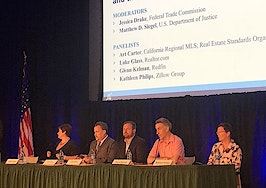The MLS RoundTable (MLSRT), a think tank whose members include multiple listing services representing about 325,000 agents and brokers nationwide, says that competition in residential real estate “has never been more fierce,” according to a new letter submitted to federal regulators.
Why does MLSRT feel the need to assert this opinion now? The Federal Trade Commission (FTC) and the U.S. Department of Justice (DOJ) held a workshop on real estate competition earlier this month and are taking public comments on the subject through July 31.
So, the eight mega MLSs that belong to the MLS RoundTable submitted their own thoughts in a letter to the federal agencies last week, detailing the “dramatic advances” that MLSs have made since the FTC and DOJ produced a joint report on competition in the real estate brokerage industry in 2007.
The RoundTable MLSs are California Regional MLS (CRMLS), Bright MLS, MRED, MLS PIN, Northwest MLS, NorthstarMLS, Carolina MLS and RealTracs.
“In our view, competition in the residential real estate market has never been more fierce. This is in part because we facilitate the national promotion of local real estate in ways that were not possible 10 years ago, allowing more real estate brokers and agents to promote, search and analyze data for more homes across more access points than ever before,” the letter, signed by an executive from each of the eight MLSs, says.
“Importantly, it is the consumer who ultimately benefits from these advances.”
MLSs now deliver and update real estate information to thousands more websites and mobile apps than they did 10 years ago; use tools that allow brokers and agents to include virtually unlimited photos, videos virtual tours, and other media with their clients’ listings; and enable brokers to choose to send their listing information to a variety of websites and software, the MLSRT letter said.
MLSs now also facilitate agents’ use of data analytics tools to bolster their ability to compete for clients and home sales and incorporate “hundreds” of additional data points into real estate listings, such as mortgage and foreclosure information; drive-time searching and mapping; flood data; and property parcel, demographic, neighborhood and school boundaries, the letter added.
“These developments — producing real estate listing information that is vastly more robust, more widely available and more efficiently accessed than it was 10 years ago — lead us to conclude that competition remains strong in our industry for real estate data management and services,” the letter says.
“Forecasts for the next 10 years include falling costs for these services across the country. This will further increase competition as brokers invest their saved dollars into bringing new consumer technologies to real estate, such as digital transactions, artificial intelligence, virtual reality and consumer analytics.”
The letter details the MLS RoundTable’s plan to streamline the delivery of listing data for real estate agents and brokers, announced in April. Elements of the plan include adopting the highest standards from the Real Estate Standards Organization (RESO); replacing aging Real Estate Transaction Standard (RETS) data feeds to third parties with the newer RESO Web API; and most of the MLSRT’s members’ commitment to joining the MLS Grid, a platform that seeks to offer a single license agreement and a single, standardized listing data feed for brokers and vendors who want to pull property data from MLSs in different markets.
The letter also touches on a subject that came up frequently during the D.C. workshop: commission transparency. On the question of whether MLSs can publicize commission rates to improve market pricing transparency, the MLSs said they “aggressively avoid” getting involved in how commissions are individually negotiated by agents.
“We collect only listing brokers’ offers of cooperative compensation to buyer agents. MLSs do not collect data on the commissions actually offered or paid by the seller or buyer, and we believe doing so would greatly heighten the risk that MLSs or their customers violate the antitrust laws. We therefore do not believe that MLSs are an appropriate pathway to publicize commission rates,” the letter says.
Asked why that would heighten the risk of antitrust violations, MLSRT Chair David Charron told Inman via email, “According to counsel, it is a generally recognized principle in antitrust case law and government guidance that the collection and dissemination among competitors of current pricing information fosters illegal price fixing. We would not want MLSs to be used in any way that conflicts with that principle.”













